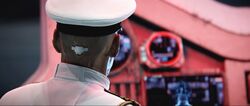Command neural interface: Difference between revisions
From Halopedia, the Halo wiki
Sith Venator (talk | contribs) No edit summary |
m (Grammar) |
||
| Line 11: | Line 11: | ||
==Trivia== | ==Trivia== | ||
*In [[Halo 3]], the hidden [[skulls]] have a Command Neural Interface at the back | *In [[Halo 3]], the hidden [[skulls]] have a Command Neural Interface at the back that can be clearly seen in Theater Mode. | ||
==Sources== | ==Sources== | ||
Revision as of 19:48, May 23, 2009
Command Neural Interface or CNI implants are implanted in the brain of every UNSC ship commander. In addition to the duties of a standard Neural Interface, they also have several purposes specific to a ship commander.
Once installed, they cannot be removed without killing the host or doing permanent damage to the host's brain and are therefore permanent. Their main use is the storage of data codes, NAV data, and also for receiving telemetry from outside sources. AIs can access the lace with the owner's consent and retrieve data for use. The owner of the lace can also receive data about the ship they command, sent directly to their retinas courtesy of the shipboard AI. The CNI Transponder of the commanding officer is the only thing with clearance for initiating a vessel's auto destruct. This way, the only way a ship may be destroyed is if its commander authorizes the destruction, or if the commander is dead, their interface may be removed. Although permanent, they can be upgraded for specialized functions.[1]
CNI's are designed so that the classified information stored within them, such as the locations of UNSC colonies, are unable to be extracted by interrogation or torture, and have been proven effective even against the Flood for a limited time.[2]
In the level Keyes, the Master Chief recovers the Command Neural Interface from the body of Captain Keyes, whose Flood-infested form had to be killed in order to retrieve it.[3]
Trivia
- In Halo 3, the hidden skulls have a Command Neural Interface at the back that can be clearly seen in Theater Mode.
